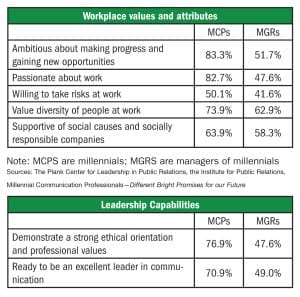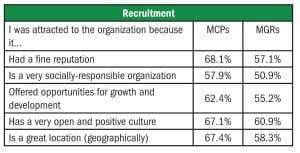
Sometimes it seems hopeless: Millennials on your team have different attitudes about work and rewards than you, the slightly older professional who manages them. What are these differences? Do gender and years on the job influence these attitudes? And likely you’re thinking about the bottom line: Can answering these questions help your communications team and the company you work for modify culture and processes to better nurture and retain millennial talent? Can you adopt best practices to appeal to millennials who’ll be entering the workforce in the future? The issues are far from academic: Millennials comprise 35% of today’s workforce, and are its largest generation. In addition, they’ll be leaders in PR and communications for the next three to four decades.
Some hope will break through the horizon courtesy of a study from The Plank Center for Leadership in Public Relations and the Institute for Public Relations, provided here first, exclusively to PR News Pro readers. While it confirms and defines differences in attitudes and expectations between millennial communicators and their managers, it offers ways to bridge the gaps, even suggesting that some differences, e.g. millennials’ digital prowess, passion for leadership and strong interest in diversity, transparency and social responsibility, can enrich the PR profession.
Specifically the study of 420 millennial communicators, aged 21-36 (called MCPs in the survey) and 420 supervisors (abbreviated as MGRs) with at least one millennial under them provides a five-part ecosystem “to attract, engage, develop, retain and gain from top millennial communication professionals,” the study says. The key, it adds, “is to contextualize and personalize steps taken in each phase of the ecosystem” (more on this below). First, the differences in workplace values and attributes.
Stark Differences in Perception
The divide was stark in workplace values and attitudes, with more than 80% of millennials saying they’re ambitious and passionate about work, but only half their managers sharing this opinion (see Workplace Values and Attributes chart). Differences in perception of leadership capabilities also were apparent. Again, 71% of millennials rated themselves ready for leadership, but only 50% of managers agreed (see Leadership Capabilities chart). Engagement was interesting. There was a significant difference in the percentage of managers and millennials who said they were engaged at work. Yet millennials with fewer than 12 months on the job were as highly engaged as managers; the level drops sharply for millennials with one to three years of experience before ebbing slowly to the year one level after the seventh year.
Some Agreement
Where millennials and managers reduced the divide, though not totally, was in recruitment and retention drivers (see charts above). A question about retention being linked to a positive and open culture was one where both camps were very close in their responses. And both responded to the open question: “What one thing could my organization do or stop doing, to increase [millennials’] commitments to our organization?” similarly. One-third in each group mentioned “improved internal communications, more recognition, more training and development, greater shared power and diversity and more mentoring.”
 Gender matters, though. Women rated their ethics and the importance of culture, reputation, diversity and social responsibility much higher than did men. They also said they were greater risk-takers and more engaged. Fortunately, as in the annual PR News Pro Salary Survey, both genders were generally positive about their communications careers.
Gender matters, though. Women rated their ethics and the importance of culture, reputation, diversity and social responsibility much higher than did men. They also said they were greater risk-takers and more engaged. Fortunately, as in the annual PR News Pro Salary Survey, both genders were generally positive about their communications careers.

How to Help
A key to the five-part talent ecosystem (mentioned above) is that each process, or part, must be contextualized and personalized. “Contextualize” refers to how things fit or are embedded in company strategy and culture. To “personalize” refers to how various steps in the ecosystem tie into a millennial’s personal role and career. The study says companies often go heavy for contextualizing, which helps them meet their goals. A combination of contextualizing and personalizing is the preferred route, the study says.
Process 1 involves the first touch with millennials; personalizing it means having brands provide honest job descriptions and diversity initiatives to the millennial. Contextualizing this process means positioning the company in the community, for example. Process 2 calls for engaging the millennial quickly, tapping the excitement and energy they initially bring to the brand. Personalizing would include providing trained mentors, delivering regular feedback and giving the millennial leadership of a small project. Contextualizing here calls for aligning the job with company goals and strategy. “Our study shows that a contextualized and personalized talent management system enriches development of this generation’s bright promises, benefiting individuals, organizations and the profession,” says Tina McCorkindale, Ph.D., president/CEO, at IPR.
